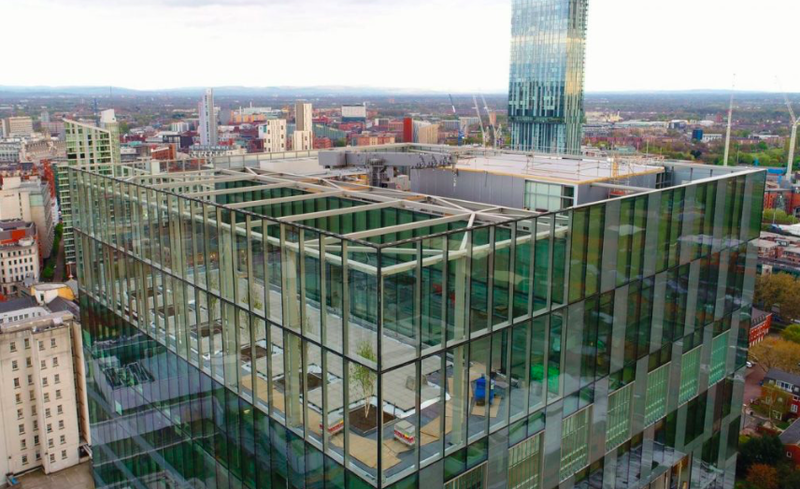Manchester is becoming a global player - but on the streets there's growing disquiet
Colliers International compiled a nifty list earlier this year.
This was created ‘in order to provide an objective analysis of the attractiveness of major European office markets: a highly detailed analysis of a wide range of factors impacting the attractiveness and magnetism of twenty major European economic hubs.’
The list includes: London, of course; Paris, of course; Berlin, yeah; Barcelona, yeah; Amsterdam, you’d think so; Brussels and Stockholm, they’d have to be up there with the best. And of course our fair city on the balmy banks of the Irwell in the north of England is included.
London is top dog, Paris is second (so far, so yawn), but where is Manchester in this list of top twenty?
Well, crikey, look, it’s third.
It ranks above Berlin, Barcelona, Amsterdam, Brussels, Stockholm, Munich, Hamburg, Vienna, Madrid. There are no other British cities in the top twenty aside from London and Manchester.
Manchester scored very highly for its ‘strong latent talent/future skills pool, high affordability and low cost’. There’s also another factor, and whisper this, dear Remainers. Compared to say Milan, Brussels or Budapest, Britain is considered to have ‘low country risk’. In other words, we’re deemed to be more stable in terms of governance than many other nations.
And there’s all of us fine upstanding folk who voted to stay in the European Union thinking we’re going to hell in a handcart with Brexit.

A big part of Manchester’s high score is down to that ‘low cost’ and flexible workforce. In other words, we’re much more ‘free market’, as is London and Dublin (fifth in the league table). No surprise there from the city that invented ‘the free trade movement’. Ouch, go the Corbynistas of socialist Manchester. Countries with much greater social legislation over working conditions and hours slip down the league table in this Colliers report.
There’s some language favouritism here too.
‘Strong English language skills and proficiency are also a clear advantage for these cities over other European locations, as are the more liberal, transparent labour markets in situ. Dublin actually has a higher English language proficiency ratio than multi-cultural London, second only to Manchester.’
This all sounds good. Good for business at least.
We might be the third most attractive place to open a business in Europe but that is cutting no ice with some people.
On the streets and across the inner areas there seems to be growing disquiet and even anger. As our international reputation for business grows there seems to be another attitude gathering pace, an old-fashioned, almost ‘us and them’ situation.
“They’re just building these offices for men in suits. Tell these people that. Manchester’s all about big corporations and yuppies now,” shouted a man with a voice edged with fury, pointing at new office block No.1 Spinningfields as I passed through St John's Gardens with a tour group. “Tell them that all this city cares about is the money, not the people. All it wants is rich people to go to all the restaurants nobody else can afford. It’s forgotten about us."
We moved on as the man became more agitated. My Chinese guests looked bemused when I explained what the man had been saying. One of them said that the new boom Chinese cities seemed to experience more confrontation between rich and poor. It was a peculiar moment.

Then again, on a tour of the Piccadilly area just this Sunday, another local, who didn’t appear an activist, said, “It’s not right, is it, the way this city’s changing?” I asked her why. “It’s not about the real people who live here anymore, it’s all about foreign visitors and buying up things like Manchester City's owners. What’s taking place in the city centre for the locals?” I listed a lot of things taking place for locals and told her that in my experience the city centre was a hundred times better than it was in 1996 both in terms of amenity and cultural offering.
“No, it’s not, not for us. Most Mancs can’t afford all that,” she said, “I don’t feel like it’s my city anymore. I feel like it’s for someone else, maybe all the people in these luxury flats.”
Following this article about tourism in Manchester, one Facebook commentator talked about how the council is producing ‘a clone city’ that will ‘completely lose the little identity it has left’.
There’s talk of how the City Council and the local corporate community will cut any deal with anybody
There's a lot of this type of talk taking place; swathes of the population believing there’s something fishy going on. There’s talk of how the City Council and the local corporate community will cut any deal with anybody, no matter whether these new shiny partners putting their money into Manchester might be overseas investors from very dodgy regimes and with very dodgy ethics.‘Affordable housing’ and its provision has become a mantra with which to beat the heads of developers. There are mumblings of this from loose associations such as Manchester Shield to activists in Momentum and elsewhere.
We might be the third most attractive place to open a business in Europe but that is cutting no ice with some people.
So Confidential is going to investigate this further, and we’d like your thoughts? Is Manchester losing its soul? Are people who complain about the changes, particularly in the City Centre, either ill-informed or plain missing the point? Does the growing ‘us and them’ divide worry you, or should it be seen as an inevitable part of the economic cycle in a democratic market economy? Are you an ‘us’ or ‘them’?
Look out for our follow-up article in which we will ask relevant people about how Manchester is dividing.












